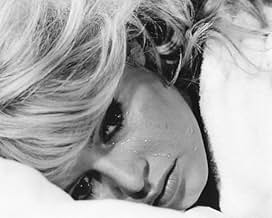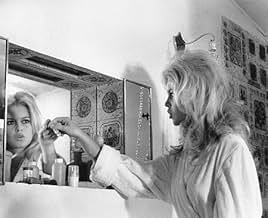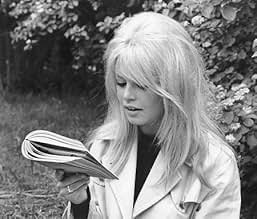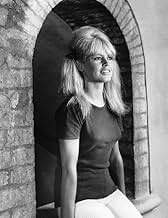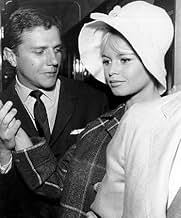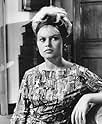IMDb RATING
5.6/10
1.3K
YOUR RATING
When Jill becomes a movie star she soon discovers that her private life is destroyed by persistent fans that won't leave her alone. Her mother's ex-lover, Fabio, tries to protect her.When Jill becomes a movie star she soon discovers that her private life is destroyed by persistent fans that won't leave her alone. Her mother's ex-lover, Fabio, tries to protect her.When Jill becomes a movie star she soon discovers that her private life is destroyed by persistent fans that won't leave her alone. Her mother's ex-lover, Fabio, tries to protect her.
- Director
- Writers
- Stars
Paul Sorèze
- Maxime
- (as Paul Soreze)
Eléonore Hirt
- Cécile
- (as Eleonore Hirt)
Jeanne Allard
- La femme de ménage
- (uncredited)
Paul Apoteker
- Le caméraman
- (uncredited)
Jean-Claude Brialy
- Le narrateur
- (voice)
- (uncredited)
Claude Day
- L'éditeur
- (uncredited)
Christian de Tillière
- Albert
- (uncredited)
- Director
- Writers
- All cast & crew
- Production, box office & more at IMDbPro
Featured reviews
One would have thought that Mastrioanni and Bardot would make 'beautiful music together'. However, this is mostly a self-indulgent treatment that could be part of the problem. Bardot's narcissistic behavior was either excellent acting or her real-life behavior.
I loved this movie for the beautiful scenes of Geneva and Spoleto, Italy. I've never seen how they do these wonderful operatic festivals and I really liked it. Georgeous technicolor. However, I could not find this movie reviewed in any of my review books: perhaps it's known by another name.
It is never clear what illness Bardot has in this movie....could have been a nervous breakdown, could have been flu, who knows? If you like looking at beautiful people, and georgous scenery, rent it. Otherwise, don't waste your time.
I loved this movie for the beautiful scenes of Geneva and Spoleto, Italy. I've never seen how they do these wonderful operatic festivals and I really liked it. Georgeous technicolor. However, I could not find this movie reviewed in any of my review books: perhaps it's known by another name.
It is never clear what illness Bardot has in this movie....could have been a nervous breakdown, could have been flu, who knows? If you like looking at beautiful people, and georgous scenery, rent it. Otherwise, don't waste your time.
Malle was an accomplished director of varied taste -- witness Pretty Baby (1977), a study in adolescent prostitution, and Au revoir les enfants (1986), a devastating account of youth in a private school in collaborationist France (with autobiographical hints.) But in Vie privee (1962) -- and please, it is Vie privee, not La vie privee (there is a difference) he achieved a dazzling, virtuosic, and at times subtle, at times hypnotic study of a movie starlet's sudden rise and precipitous fall from the limelight; her intense ambition, hiding a neurotic self-love, seems to evaporate as her life enters a new phase, becoming involved with a friend's former lover whom she had looked to for help. Bardot is captivating: she fills the screen, by turns stunning, radiant, and brooding, playing the role as though it were her life's story; add a suave and elegant Marcello Mastroianni as the glitterati who hides the fallen starlet from public view, and you have an electric mix. Watch the film in French with subtitles, please: only the original French conveys the cynical boredom of Jill (Bardot's character) and the paparazzi who swarm around her. And watch it also for Henri Decae's camera -- how it jumps from face to floor, cropping a doorway so that Bardot fills it, for example! -- and for Bernard Evein's glorious saturated colors. And the account of the Verdi Requiem at the Spoleto Festival makes a nice counterpoint to Jill's mundane existence with Fabio (Mastroianni). Oh -- the 'difference' mentioned in the French title is that without the 'La' ('the') vie privee carries a suggestion of 'a deprived life' as well as 'a private life.' Compare to the American version, called 'A Very Private Affair'!
In 1961,BB was the biggest star France had ever had.Never in the history of French cinema an actress had crystallized around her such an adulation..but also so much hatred.One scene sums up everything;in an elevator ,Jill (BB) meets a cleaning lady who insults her,calls her whore and tells her that while she is playing around,her brother is fighting in Algeria.This woman of the people epitomizes what a lot of common men used to think circa 1960.Like in Clouzot's "la vérité" ,as an user wrote,the people is judging Bardot.
"Vie privée" is looked upon as one of Louis Malle's weakest efforts and it's probably unfair.He did much worse later ("le souffle au coeur"(1971).Its hints at Bardot's own life seem dated now but they inspire its vital extremism:Jill (BB) becomes a big star and it's a hellish life which begins.The scene when Jill is tracked down in her own house by journalists is barely fiction:in her memoirs,BB tells that German tourists' tour in Saint-Tropez included her house's visit!!The movie has two parts;the first one is the rise of the star and her efforts to escape from the maddening crowd:Louis Malle uses too much voice over,and a telegraphic style,très nouvelle vague.The second part depicts her relationship with a handsome Italian (Mastroianni),but even in a foreign country she's got to hide in a bedroom.The movie turns a bit pretentious ,with pompous music -from an opera Mastroianni is directing-;and after the rise,comes the fall (in every sense of the term).
BB was never a bimbo (une ravissante idiote) but a clever sensitive woman.We feel it in Malle's work.Watch it for her.
"Vie privée" is looked upon as one of Louis Malle's weakest efforts and it's probably unfair.He did much worse later ("le souffle au coeur"(1971).Its hints at Bardot's own life seem dated now but they inspire its vital extremism:Jill (BB) becomes a big star and it's a hellish life which begins.The scene when Jill is tracked down in her own house by journalists is barely fiction:in her memoirs,BB tells that German tourists' tour in Saint-Tropez included her house's visit!!The movie has two parts;the first one is the rise of the star and her efforts to escape from the maddening crowd:Louis Malle uses too much voice over,and a telegraphic style,très nouvelle vague.The second part depicts her relationship with a handsome Italian (Mastroianni),but even in a foreign country she's got to hide in a bedroom.The movie turns a bit pretentious ,with pompous music -from an opera Mastroianni is directing-;and after the rise,comes the fall (in every sense of the term).
BB was never a bimbo (une ravissante idiote) but a clever sensitive woman.We feel it in Malle's work.Watch it for her.
This movie did a great job of showing the French lifestyle and the time during which it was made. Most of the comments here are negative, but I thought this was one of the best movies I've seen in many months.
Jill's daily life, shown in the opening sequence when she travels by boat and bicycle to see her mother and various friends, is a wonderful example of European life where things are much prettier and healthier than in the US. Individuals are free to be with nature without making a conscious effort to do so.
The story of the movie is OK, not great, but certainly ahead of its time in the portrayal of the media culture. Diana Princess of Wales should have watched this movie.
Jill's daily life, shown in the opening sequence when she travels by boat and bicycle to see her mother and various friends, is a wonderful example of European life where things are much prettier and healthier than in the US. Individuals are free to be with nature without making a conscious effort to do so.
The story of the movie is OK, not great, but certainly ahead of its time in the portrayal of the media culture. Diana Princess of Wales should have watched this movie.
Watching Louis Malle's La Vie Privée was an exercise in patience that finally managed to pay off. It wasn't even the bleak colors (remeniscent of the cheap color prints of the 60's) or the lack of chemistry between Bardot and Mastroianni that pushed the audience to the limit. It was perhaps the stilted dialog, made nearly unbearable by the fact that it was poorly dubbed into English. Maybe the film would have worked better in black and white or as a silent. Maybe not...The films final sequence (stretching over the last seven minutes) redeems nearly all its faults. The carefully composed shots, alternating between the faces of the stars and a play being performed on stage (with a remarkable backdrop of an old Spoletto basilica) empowered by moving music brings us closest to the characters. Once again, the so-called "silent" moment dominates the film, showing us the director's capabilities in full bloom. The tension is enhanced by an increased tempo in editing, leading perfectly to the climax. For what may be a deeply flawed film, I feel bad for the people that left early. Those last seven minutes define great film-making.
Did you know
- TriviaFrench actor Michel Auclair dubs Marcello Mastroianni's voice in French.
- ConnectionsFeatured in Censura: Alguns Cortes (1999)
- SoundtracksSidonie
Music by Jean-Max Rivière and Giannis Spanos
Lyrics by Charles Cros
Performed by Brigitte Bardot
- How long is A Very Private Affair?Powered by Alexa
Details
- Runtime
- 1h 43m(103 min)
- Aspect ratio
- 1.85 : 1
Contribute to this page
Suggest an edit or add missing content


